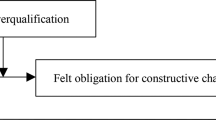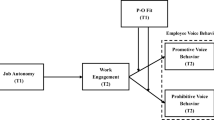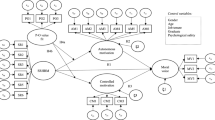Abstract
Based on positive psychology, this study investigates how a strengths-based psychological climate promotes voice behavior via two motivation states. Drawing on the model of proactive motivation, we develop a moderated-mediation model of the motivation processes linking a strengths-based psychological climate and voice behavior. We further argue that these relationships are moderated by employees’ collectivism. To test our hypotheses, we performed a three-wave survey to collect data from 192 Chinese employees. Results showed that a strengths-based psychological climate directly promoted employees’ voice behavior while self-efficacy and felt obligation mediated the relationship. Employees’ collectivism moderated the indirect effects of a strengths-based psychological climate and voice behavior via self-efficacy and felt obligation. These findings advance our knowledge of how and when strengths-based HR practices function in organizations and contribute to the voice literature.




Similar content being viewed by others

Data Availability
The datasets used or analyzed during the current study are available in the [OSF] repository, [https://osf.io/jk9se/?view_only=13aea568d84948358a88f594066432e9].
References
Bagozzi, R. P., & Yi, Y. (1990). Assessing method variance in multitrait-multimethod matrices: The case of self-reported affect and perceptions at work. Journal of Applied Psychology, 75(5), 547–560. https://doi.org/10.1037/0021-9010.75.5.547
Bandura, A. (1997). Self-efficacy: the exercise of control. New York: Freeman Press.
Basit, A. A. (2017). Trust in supervisor and job engagement: Mediating effects of psychological safety and felt obligation. The Journal of Psychology, 151(8), 701–721. https://doi.org/10.1080/00223980.2017.1372350
Becker, T. E. (2005). Potential problems in the statistical control of variables in organizational research: A qualitative analysis with recommendations. Organizational Research Methods, 8(3), 274–289. https://doi.org/10.1177/1094428105278021
Bowen, D. E., & Ostroff, C. (2004). Understanding HRM–firm performance linkages: The role of the “strength” of the HRM system. Academy of Management Review, 29(2), 203–221. https://doi.org/10.5465/amr.2004.12736076
Brislin, R. W. (1986). The wording and translation of research instrument. In W. Lonner, & J. Berry (Eds.), Field methods in cross-cultural research (pp. 137–164). Beverly Hills, CA: Sage.
Caesens, G., & Stinglhamber, F. (2014). The relationship between perceived organizational support and work engagement: The role of self-efficacy and its outcomes. European Review of Applied Psychology, 64(5), 259–267. https://doi.org/10.1016/j.erap.2014.08.002
Chan, S. C. H. (2014). Paternalistic leadership and employee voice: Does information sharing matter? Human Relations, 67(6), 667–693. https://doi.org/10.1177/0018726713503022
Chen, J., Wang, L., & Tang, N. (2016). Half the sky: The moderating role of cultural collectivism in job turnover among Chinese female workers. Journal of Business Ethics 133(3), 487–498. https://doi.org/10.1007/s10551-014-2395-1
Dubreuil, P., Forest, J., & Courcy, F. (2014). From strengths use to work performance: The role of harmonious passion, subjective vitality, and concentration. Journal of Positive Psychology, 9(4), 335–349. https://doi.org/10.1080/17439760.2014.898318
Eisenberger, R., Armeli, S., Rexwinkel, B., Lynch, P. D., & Rhoades, L. (2001). Reciprocation of perceived organizational support. Journal of Applied Psychology, 86(1), 42–51. https://doi.org/10.1037/0021-9010.86.1.42
Forest, J., Mageau, G. A., Crevier-Braud, L., Bergeron, É., Dubreuil, P., & Lavigne, G. L. (2012). Harmonious passion as an explanation of the relation between signature strengths’ use and well-being at work: Test of an intervention program. Human Relations, 65(9), 1233–1252. https://doi.org/10.1177/0018726711433134
Fredrickson, B. L., & Losada, M. F. (2005). Positive affect and the complex dynamics of human flourishing. American Psychologist, 60(7), 678–686. https://doi.org/10.1037/0003-066X.60.7.678
Hayes, A. F. (2017). Introduction to mediation, moderation, and conditional process analysis: A regression-based approach. New York: Guilford Press.
He, C., Gu, J., & Liu, H. (2018). How do department high-performance work systems affect creative performance? A cross‐level approach. Asia Pacific Journal of Human Resources, 56(3), 402–426. https://doi.org/10.1111/1744-7941.12156
Hofstede, G. (1980). Culture’s consequences: International differences in work-related values. Beverly Hills, CA: Sage.
Hui, C., Lee, C., & Wang, H. (2015). Organizational inducements and employee citizenship behavior: The mediating role of perceived insider status and the moderating role of collectivism. Human Resource Management, 54(3), 439–456. https://doi.org/10.1002/hrm.21620
Kao, K. Y., Hsu, H. H., Thomas, C. L., et al. (2021). Motivating employees to speak up: Linking job autonomy, P-O fit, and employee voice behaviors through work engagement. Current Psychology. https://doi.org/10.1007/s12144-020-01222-0
Lavy, S., & Littman-Ovadia, H. (2017). My better self: Using strengths at work and work productivity, organizational citizenship behavior, and satisfaction. Journal of Career Development, 44(2), 95–109. https://doi.org/10.1177/0894845316634056
Lee, A., Thomas, G., Martin, R., Guillaume, Y., & Marstand, A. F. (2019). Beyond relationship quality: The role of leader–member exchange importance in leader–follower dyads. Journal of Occupational and Organizational Psychology, 92(4), 736–763. https://doi.org/10.1111/joop.12262
Liang, J., Farh, C. I., & Farh, J. L. (2012). Psychological antecedents of promotive and prohibitive voice: A two-wave examination. Academy of Management Journal, 55(1), 71–92. https://doi.org/10.5465/amj.2010.0176
Meyers, M. C., & Van Woerkom, M. (2017). Effects of a strengths intervention on general and work-related well-being: The mediating role of positive affect. Journal of Happiness Studies, 18(3), 671–689. https://doi.org/10.1007/s10902-016-9745-x
Miglianico, M., Dubreuil, P., Miquelon, P., Bakker, A. B., & Martin-Krumm, C. (2020). Strength use in the workplace: a literature review. Journal of Happiness Studies, 21(2), 737–764. https://doi.org/10.1007/s10902-019-00095-w
Morrison, E. W., Wheeler-Smith, S. L., & Kamdar, D. (2011). Speaking up in groups: A cross-level study of group voice climate and voice. Journal of Applied Psychology, 96(1), 183–191. https://doi.org/10.1037/a0020744
Ostroff, C., Kinicki, A. J., & Tamkins, M. M. (2003). Organizational culture and climate. In W. C. Borman, D. R. Ilgen, & R. J. Klimoski (Eds.), Handbook of psychology: Industrial and organizational psychology (12 vol., pp. 565–593). Hoboken, NJ: Wiley.
Parker, S. K., Bindl, U. K., & Strauss, K. (2010). Making things happen: A model of proactive motivation. Journal of Management, 36(4), 827–856. https://doi.org/10.1177/0149206310363732
Peterson, C., & Seligman, M. E. P. (2004). Character strengths and virtues: A handbook and classification. New York, NY: Oxford University Press.
Podsakoff, P. M., MacKenzie, S. B., Lee, J. Y., & Podsakoff, N. P. (2003). Common method biases in behavioral research: a critical review of the literature and recommended remedies. Journal of Applied Psychology, 88(5), 879–903. https://doi.org/10.1037/0021-9010.88.5.879
Qian, X., Li, Q., Song, Y., & Wang, J. (2020). Temporary employment and voice behavior: the role of self-efficacy and political savvy. Asia Pacific Journal of Human Resources, 58(4), 607–629. https://doi.org/10.1111/1744-7941.12232
Qin, X., Chen, C., Yam, K. C., Huang, M., & Ju, D. (2020). The double-edged sword of leader humility: Investigating when and why leader humility promotes versus inhibits subordinate deviance. Journal of Applied Psychology, 105(7), 693–712. https://doi.org/10.1037/apl0000456
Rath, T. (2007). StrengthsFinder 2.0. New York, NY: Gallup Press
Scholz, U., Doña, B. G., Sud, S., & Schwarzer, R. (2002). Is general self-efficacy a universal construct? Psychometric findings from 25 countries. European Journal of Psychological Assessment, 18(3), 242–251. https://doi.org/10.1027//1015-5759.18.3.242
Sheldon, K. M., & King, L. (2001). Why positive psychology is necessary. American Psychologist, 56(3), 216–217. https://doi.org/10.1037/0003-066X.56.3.216
Takeuchi, R., Chen, Z., & Cheung, S. Y. (2012). Applying uncertainty management theory to employee voice behavior: An integrative investigation. Personnel Psychology, 65(2), 283–323. https://doi.org/10.1111/j.1744-6570.2012.01247.x
Tett, R. P., & Burnett, D. D. (2003). A personality trait-based interactionist model of job performance. Journal of Applied Psychology, 88(3), 500–517. https://doi.org/10.1037/0021-9010.88.3.500
Van Woerkom, M., & de Bruijn, M. (2016). Why performance appraisal does not lead to performance improvement: Excellent performance as a function of uniqueness instead of uniformity. Industrial and Organizational Psychology, 9(2), 275–281. https://doi.org/10.1017/iop.2016.11
Van Woerkom, M., & Meyers, M. C. (2015). My strengths count! Effects of a strengths-based psychological climate on positive affect and job performance. Human Resource Management, 54(1), 81–103. https://doi.org/10.1002/hrm.21623
Wagner, J. A., & Moch, M. K. (1986). Individualism-collectivism: Concept and measure. Group and Organization Studies, 11(3), 280–304. https://doi.org/10.1177/105960118601100309
Wang, Q., Weng, Q., McElroy, J. C., Ashkanasy, N. M., & Lievens, F. (2014). Organizational career growth and subsequent voice behavior: The role of affective commitment and gender. Journal of Vocational Behavior, 84(3), 431–441. https://doi.org/10.1016/j.jvb.2014.03.004
Wang, J., Zhang, Z., & Jia, M. (2020). Echoes of corporate social responsibility: how and when does CSR influence employees’ promotive and prohibitive voices? Journal of Business Ethics, 167(2), 253–269. https://doi.org/10.1007/s10551-019-04151-6
Williams, L. J., Vandenberg, R. J., & Edwards, J. R. (2009). Structural equation modeling in management research: A guide for improved analysis. The Academy of Management Annals, 3(1), 543–604.https://doi.org/10.1080/19416520903065683
Wood, A. M., Linley, P. A., Maltby, J., Kashdan, T. B., & Hurling, R. (2011). Using personal and psychological strengths leads to increases in well-being over time: A longitudinal study and the development of the strengths use questionnaire. Personality and Individual Differences, 50(1), 15–19.https://doi.org/10.1016/j.paid.2010.08.004
Xu, Z., Yang, F., & Peng, J. (2021). How does authentic leadership influence employee voice? From the perspective of the theory of planned behavior. Current Psychology. https://doi.org/10.1007/s12144-021-01464-6
Zhang, J., Akhtar, M. N., Zhang, Y., & Rofcanin, Y. (2019). High-commitment work systems and employee voice: A multilevel and serial mediation approach inside the black box. Employee Relations, 41(4), 811–827.https://doi.org/10.1108/ER-08-2018-0218
Funding
This work was supported by the National Natural Science Foundation of China [grant number 71972032 and 72172032]; the Fundamental Research Funds for the Central Universities of China [grant number N2006005 and N2106005]. Program for Innovative Research Team of Shanghai University of Finance and Economics (No. 2020110927).
Author information
Authors and Affiliations
Contributions
Jianfeng Jia designed the theoretical framework and collected data. Ruonan Zhao analyzed data and wrote the first draft. Yahua Cai revised the first draft. Hongwei Lv assisted in data analysis and provided valuable suggestions. All authors read and approved the final manuscript.
Corresponding authors
Ethics declarations
Conflict of interest
The authors declare that they have no conflict of interests.
Ethical Standards
All procedures performed in studies involving human participants were in accordance with the ethical standards of the institutional and/or national research committee and with the 1964 Helsinki Declaration and its later amendments or comparable ethical standards.
Informed consent
Informed consent was obtained from all individual participants included in the study.
Additional information
Publisher’s Note
Springer Nature remains neutral with regard to jurisdictional claims in published maps and institutional affiliations.
Rights and permissions
Springer Nature or its licensor holds exclusive rights to this article under a publishing agreement with the author(s) or other rightsholder(s); author self-archiving of the accepted manuscript version of this article is solely governed by the terms of such publishing agreement and applicable law.
About this article
Cite this article
Jia, J., Zhao, R., Cai, Y. et al. I can and I am willing: A dual mediation model of a strengths-based psychological climate and voice behavior. Curr Psychol 42, 24935–24946 (2023). https://doi.org/10.1007/s12144-022-03432-0
Accepted:
Published:
Issue Date:
DOI: https://doi.org/10.1007/s12144-022-03432-0



